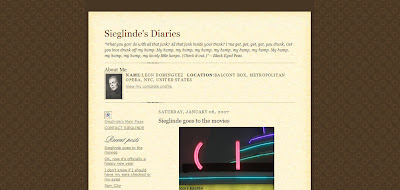 Snow decisively drifting at this hour. Regarding this current Jenufa, which I adore and am seeing again this evening, Alex Ross asks:
Snow decisively drifting at this hour. Regarding this current Jenufa, which I adore and am seeing again this evening, Alex Ross asks:
Why do Janácek's operas still fail to sell strongly at the Met?
I have here list of a dozen factors that can boost ticket sales: (1) singer with extra-opera popularity in cast (e.g., Renee and Anna, Angela and Placido); (2) international singer from country with large tri-state representation (Anna and Dmitri pull in the Russians, Hong and Kim's just concluded
Traviata well-attended by Korean population); (3) entry level opera (
Aida,
Boheme,
Carmen vs.
Ariadne,
Bartered Bride,
Clemenza di Tito); (4) composer popularity (Puccini and Verdi); (5) operas of some extra-musical cultural importance (
Onegin is popular with Russian New Yorkers;
Turandot and
Butterfly pull in Asians, and the Chinese came out for Tan Dun's
First Emperor); (6) novelty factor (Met premiere, world premiere, new production premiere, rare opera); (7) cults (i.e., Wagner); (8) extraordinary press, unanimous acclaim, mercurial buzz (Mattila's
Salome, Minghella's
Butterfly); (9) debut of a major artist (Bartoli sold out the
Cosi, Taymor sold out the first couple of years of her
Zauberflote, and watch how Audra McDonald and Kristin Chenoweth will do the same); (10) rarity of local engagements of singer (Millo, Gheorghiu, Bartoli); (11) an ardent, sometimes inexplicable, following of a singer among rabid opera fans (Filianoti, Domingo, Netrebko, Mattila, Fleming, Florez, Hvorostovsky, Voigt, Pape, et al.); (12) star conductor (Levine, Gergiev, Thielemann; Gelb's strategy to bring in Barenboim and Muti will pay off handsomely).
So, for the
Jenufa, here's the scorecard: (1) Karita and Anja are popular only within knowledgeable classical music fans; (2) Finns aren't really a big bunch of folks anywhere, even in their own country (only 7 million); perhaps the Germans are coming to see Anja? or not?; (3) not an entry level work by any measure; (4) Janacek isn't familiar; (5) Czech population in New York probably isn't sizeable, I'm guessing; (6)
Jenufa is a rarely performed opera, so that's one positive factor; (7) unfortunately, it wasn't written by Wagner; (8) enthusiastic press but not infectious, no buzz beyond Anja Silja's incredible age; (9) no one major is debuting; (10) clearly, Anja is a rare sighting in these shores, so that's another point; (11) Mattila has a strong fan base in New York; (12) Belohlavek. However, the aggregate "score" of this current run of
Jenufa is barely average, not strong enough to fill such a large house for six nights.
Working out the scorecard for the current
Eugene Onegin, on the other hand, explains why all its evenings are sold out. (Same with Netrebko's just-concluded
Puritani and, I predict, Gheorghiu's
Simon Boccanegra.)




























